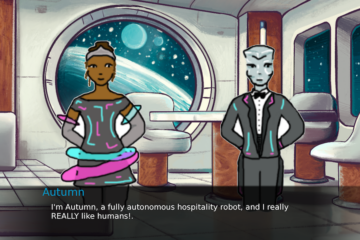Most of us drop right into the setting of a writing workshop and we’re handed some sheets of someone else’s precious, undying prose, and set to work with no more guideline than “Tell us how you feel about this story.” This … is a recipe for more hurt feelings than writerly growth.
First off, critique is an intimate, emotional act. As such, you must secure consent and set expectations.
Consent
The only critique you can give anyone without consent is an unadulterated, pure, unqualified, and VAGUE compliment. I’m serious. Even being specific, like saying, “I like your beginning,” can open a can of worms. IE, “So you didn’t like the end??”
If you want to say ANYTHING other than “It’s good, I like it,” you’re gonna need consent.
And set those expectations. Even if everyone agrees to exchange critique, we also need to consent to how much criticism we’re in for. I ask new critique partners, “What are you hoping to get out of this critique?” Frequently, new writers have very vague requests, like, “Is it worth pursuing?” “Is it any good?”
Those aren’t useful questions, but they don’t know that yet. I say something like, “Assume I said yes. You are choosing to pursue this story, therefore it is worth pursuing. Also, there is no single metric of ‘good’. Is it a good mystery? Is it a good horror?”
I offer them three tiers. “Are you looking A) for encouragement to keep going, B) for feedback to get better, or C) for me to bathe this story in the merciless fire of my full professional opinion?”
Most people go for option B, but there’s no wrong answer. If they answer A, I have it easy. I skim the story, find something that shows promise, and compliment it.
“I think this really picks up when you get into dialog. Try writing more of that.” or “This character is interesting, I was surprised by their actions, in a good way.”
Do I wish I could also mention that they need to drop out of their stream of consciousness and show some action? Do I yearn to point out the fourteen times they change tense on the first page? Yes. But this isn’t about me. This is their critique. They have consented to one thing, and that’s what I give them. Encouragement.
If they choose C, that’s also easy. I just let ‘er rip. This level is between equals who understand the under-pinnings of critique. I’ll talk more about that later. Let’s talk about the most common possibility, though.
If they choose B, we’re in a middle ground, and follow up questions are required. “Are you shooting for eventual publication? How high-level do you want this critique to be? How finished is this draft? Should I focus on the structure of the story itself, or the surface level of word choice and grammar?”
Sometimes it takes a few back-and-forths to find out just how much someone new to critique really wants to hear, or is ready to hear. Critique isn’t like exchanging presents, here’s mine, here’s yours. It’s a dialog, between you, your partner, and the words on the page.
Focus on Being a Reader
The best a partner can do is give honest reactions. Be a reader, and be an individual. Don’t try to speak for a mythical “audience.” Use “I” phrases: “I’m confused.” “I am losing interest here.”
I avoid giving proscriptions or suggestions in this sort of critique. I don’t say “Cut this paragraph” I say “I had an urge to skim past this paragraph.” I’m pointing out the problems, leaving it to the writer to decide how to deal with them. I’m the patient, not the doctor.
I used to work myself into knots, trying to solve and fix every problem with everyone else’s story … but the thing is, I don’t know the story as it exists in the author’s head, only how it is on the page. Trying to critique what isn’t written is trying to read minds, and I don’t have that superpower. It took reading The Anti-Racist Writing Workshop to realize I had absolute permission not to play plot-doctor.
How freeing that was! Not only is it easier to just point out the problems, your critique partner will appreciate it more. You are showing them how a reader reacts to the story as written.
C. The Merciless Fire
I admit, when I do the “let it all out” critique, I read the piece as though it were my own. This has all kinds of problems, because the story I write is going to be different. It’s going to have my perspective and quirks. I’m a very concise writer, and I will make a lot of “you could cut this” comments.
There’s no such thing as the wrong style.
So, even in the “merciless fire” critique, I make sure to indicate that these are suggestions with words like “Could” or “if you want” and those handy I-statements. For example, “If you’re looking to shorten this piece, I would cut this paragraph.” or “If you want to showcase the decision here, I’d slow down and give each step its own sentence.”
With my very best friends, we’ve critiqued each other so much and so often, we can leave that out, or we shorten it to an occasional “YMMV” for “Your mileage may vary.”
Fight The Negative Default
You can give someone twenty compliments and one criticism and they will remember zero of the compliments and focus on that one criticism. This is just how we humans work. Our dumb brains focus on the negative, on the threat, on the danger. It’s how we survived to procreate and evolve. Yay us.
Even when someone has agreed to the Excoriating Fire Critique Level C, there are going to be positives to the story, and as a critique partner, I have to make sure those are heard. Repetition and placement helps.
Repetition: When I finish my critique, I offer a summary of my general thoughts, what I think is the most important/ actionable problem with the narrative, and I repeat all the good things, especially the Best Thing, which I may state again at the end of my list.
Placement: one old, old bit of advice on critique I got ages ago was to deliver a criticism between two compliments. “The Shit sandwich” we call it – putting two nice things on either side of the ‘shit’ so it goes down easier.
Eew. Yeah, it’s not a great metaphor. Maybe we should call it the medicine sandwich?
Also, because the last thing said often holds a little extra weight in the hearer’s mind, I try to save my best, strongest compliments for last.
Be Honest
Critique takes time and emotional strain. It takes thought and care. Don’t agree to a critique you don’t really have time or energy to do. I have, and the result is almost always garbage, a critique that doesn’t help because I was skimming and missed important plot points or I give crabby results I wouldn’t have had if I were reading with a calm mind.
If there is something offensive or personally objectionable in the story you are critiquing, it can feel very hard to point it out to the author. Remember though that no one wants to be offensive! (Well, okay, I suppose some people do. Ugh. Don’t critique for people who want to be offensive to you.)
Again, lead with the I statements. “I found it objectionable that…” or “I was offended by this wording.”
If they start to argue, well, that’s about being a good critique RECEIVER. You did your job as a critique GIVER by offering them the information of how a reader reacted– what they do with it is their problem.
Remember that you gave an honest emotional reaction – and that cannot be wrong. Be kind to yourself, and conserve your emotional energy and time. You lead a horse to water, it’s his own business if he wants to stay thirsty.
Fight Group-Think
In a group critique session, it can be easy to be swayed by the group. We want people to like us, we want to fit in. If I adored this character and three other people say they were unlikeable, well, maybe there’s something wrong with my reading?
No. Absolutely not. Maybe you are more the audience for the story than those other readers. When you feel tempted to change your mind on hearing other critiques, analyze your reaction – is this because you are honestly looking at it in a new way, or because you feel insecure in your critique?
If you are honest, and you are in touch with your emotional response to the story, then you have no reason to feel insecure.
That is the true work of critique – to playtest a story, to be the emotion-haver. This is a skill anyone can cultivate, separate and distinct from the skill of writing.


